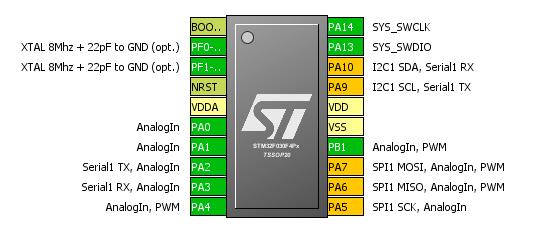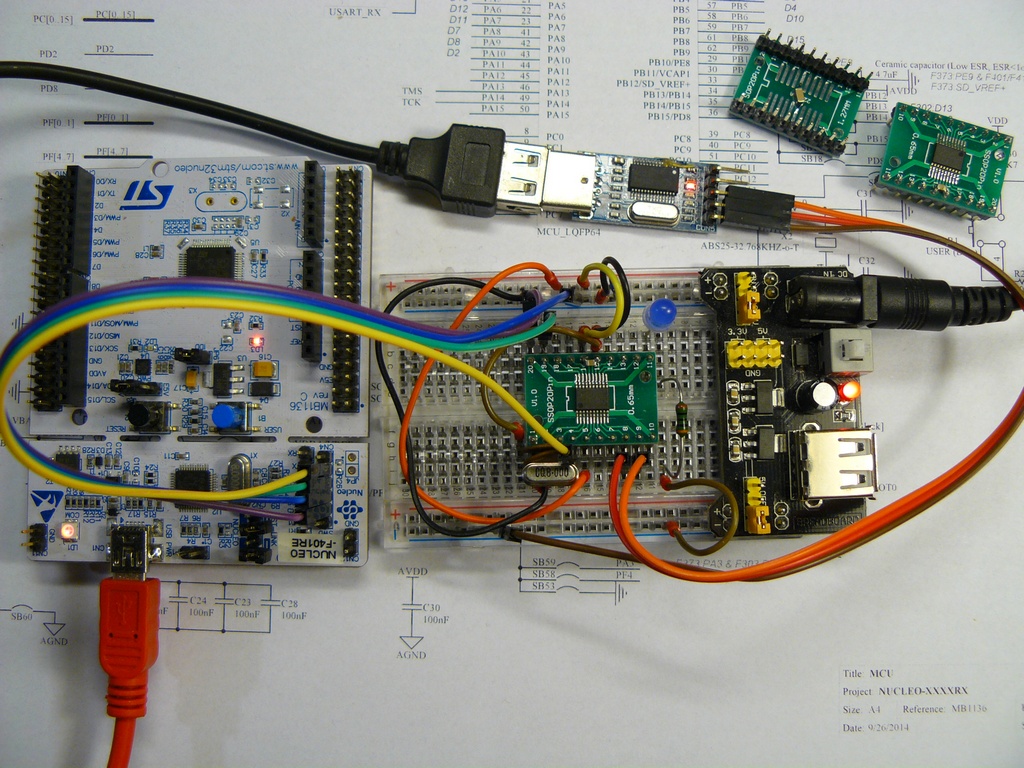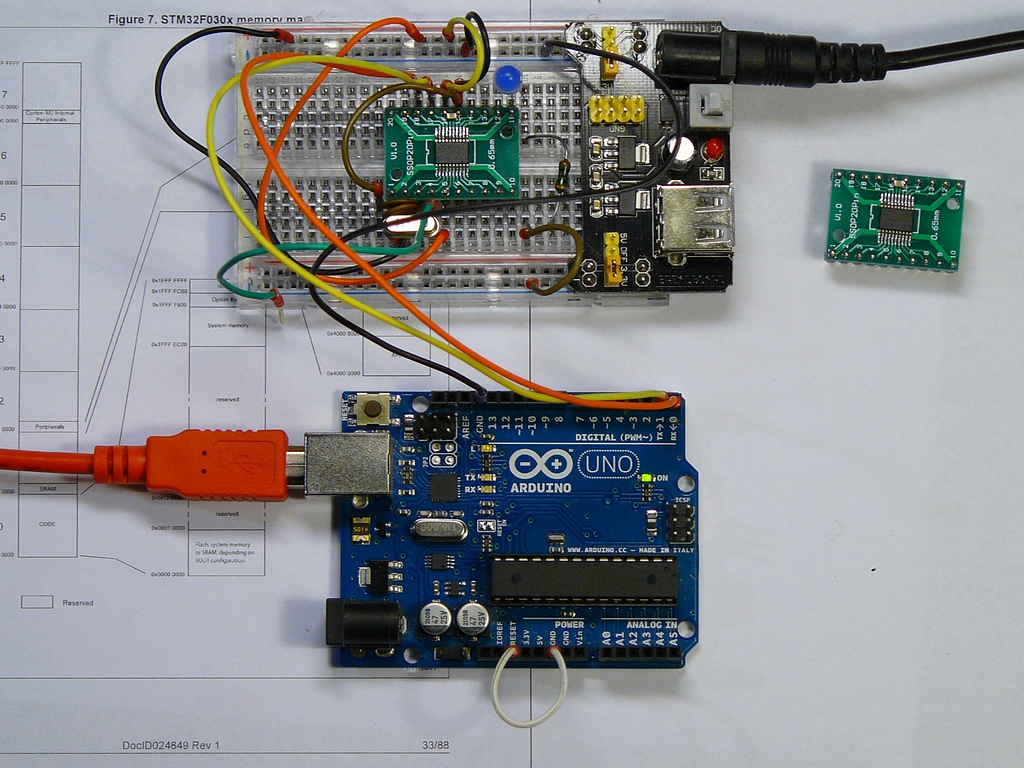Modification of mbed-src library only for STM32F030F4, very cheap microcontroller in 20-Pin TSSOP package, with 16Kbytes of Flash and 4Kbytes of Ram. **Target for online compilator must be Nucleo 32F030R8.**
Dependents: STM32F031_blink_LED_2
Information
For programming similar chips in TSSOP20 package, but with 32kB flash: STM32F031F6 and STM32F050F6 (virtually identical to STM32F031F6 and no longer produced but still on sale), it is recommended to use NUCLEO-F031K6 as compiler platform, and the mbed library without the need for any modifications.
Just remember that the only significant difference between these chips and NUCLEO-F031K6 is the lack of pins: PB_0, PB_3, PB_4, PB_5, PB_6, PB_7, PA_11, PA_12, PA_15 in TSSOP-20.
STM32F030F4 pinout (pin functions supported in mbed library).

other pins:
| Pin nr | Pin name | Connected | ST-LINK on Nucleo (programming and debug) |
|---|---|---|---|
| 1. | BOOT0 | GND | |
| 4. | NRST | CN4 pin 5 | |
| 5. | VDDA | +3.3V | |
| 15. | VSS | GND | CN4 pin 3 |
| 16. | VDD | +3.3V | |
| 19. | SWDIO | CN4 pin 4 | |
| 20. | SWCLK | CN4 pin 2 |
- Remove jumpers CN2 on Nucleo when CN4 is connected to STM32F030F4
- NRST connection is not necessarily needed, but in this case, after programming it is necessary to manually reset the target processor
STM32R030F4 programming using Nucleo (any type):
 Notes:
Notes:
- When programming using the Nucleo virtual disk (drag and drop) , first turn on the power STM32F030F4, and then connect Nucleo to USB. When programming with "ST-LINK Utility", it does not matter.
STM32R030F4 programming using Arduino (as a simple USB-Serial converter) and FlyMcu program:

Notes:
- For Usart in STM32F030F4, only 5V tolerant TX, RX pins are pins 17 and 18. Just their uses internal serial bootloader, so you can use such Arduino or other USB-Serial converter operating as standard 5V.
- Where used FlyMcu, binary file from online compiler Mbed need to convert to intel hex file and during the conversion add the data offset 0x08000000 (or if offset is 0, manually add/edit the first line of the .hex file to ":020000040800F2").
- During programming procedure, pin 1 (BOOT0) should be connected to 3.3 V. And before contact with the loader program, temporarily pin 4 (NRST) shorted to GND to reset the chip. After programming BOOT0 is connected to GND.
- In this set with Arduino Uno, the "Flash loader demonstrator" from STM does not work (does not recognize the response from the chip at the initial stage of connection). But with Arduino Duemilanove program "STM Flash loader demonstrator" works perfectly (ver. 2.7.0). And do not need any additional file conversion (as the need for FlyMcu). You can use a binary file directly from the on-line compiler mbed.
Warning.
Because of the small size of the STM32F030F4 flash, for programs that use UART, it is proposed not to use the Serial class but use the <cstdio> (stdio.h) functions that directly use stdout and stdin (e.g printf().putchar(),getchar(),vprintf(),scanf() ).
Example:
version with serial class
#include "mbed.h"
Serial pc(USBTX, USBRX); // tx, rx
int main()
{
pc.printf("Hello World!\n");
}
consuming 13.7kB FLASH and 1.5kB RAM
but this:
version without serial class
#include "mbed.h"
int main()
{
printf("Hello World!\n");
}
consuming only 8.7kB FLASH and 0.4kB RAM
5kB used flash difference (with 16kB total size) !!!
However, if you need other than the default UART settings for stdin and stdout (that is 9600b, pins PA_2, PA_3), you can do as an example:
change uart pins and speed
#include "mbed.h"
// declarations needed to change here the parameters of stdio UART
extern int stdio_uart_inited;
extern serial_t stdio_uart;
int main()
{
// for change pins
serial_init(&stdio_uart, PA_9,PA_10);
stdio_uart_inited=1;
// for change baud rate
serial_baud(&stdio_uart, 115000);
printf("Hello World!\n");
}
uVision users
In the case of online compilation of the program with this library using Keil, to prevent linker errors set in the project options "One ELF Section per Function" and Optimisation: Level 2.
Additional information (and inspiration for this modification):
http://developer.mbed.org/forum/electronics/topic/5184/
http://developer.mbed.org/questions/4643/Does-mbed-support-STM32F030F4/
http://developer.mbed.org/questions/2927/mbed-on-other-packages-stm32f030f4-TSSOP/
http://developer.mbed.org/questions/4139/Programming-STM32F030F4-with-Nucleo-F030/
common/retarget.cpp
- Committer:
- mega64
- Date:
- 2014-10-18
- Revision:
- 0:38ccae254a29
- Child:
- 6:3c60dac207ae
File content as of revision 0:38ccae254a29:
/* mbed Microcontroller Library
* Copyright (c) 2006-2013 ARM Limited
*
* Licensed under the Apache License, Version 2.0 (the "License");
* you may not use this file except in compliance with the License.
* You may obtain a copy of the License at
*
* http://www.apache.org/licenses/LICENSE-2.0
*
* Unless required by applicable law or agreed to in writing, software
* distributed under the License is distributed on an "AS IS" BASIS,
* WITHOUT WARRANTIES OR CONDITIONS OF ANY KIND, either express or implied.
* See the License for the specific language governing permissions and
* limitations under the License.
*/
#include "platform.h"
#include "FileHandle.h"
#include "FileSystemLike.h"
#include "FilePath.h"
#include "serial_api.h"
#include "toolchain.h"
#include <errno.h>
#if defined(__ARMCC_VERSION)
# include <rt_sys.h>
# define PREFIX(x) _sys##x
# define OPEN_MAX _SYS_OPEN
# ifdef __MICROLIB
# pragma import(__use_full_stdio)
# endif
#elif defined(__ICCARM__)
# include <yfuns.h>
# define PREFIX(x) _##x
# define OPEN_MAX 16
# define STDIN_FILENO 0
# define STDOUT_FILENO 1
# define STDERR_FILENO 2
#else
# include <sys/stat.h>
# include <sys/unistd.h>
# include <sys/syslimits.h>
# define PREFIX(x) x
#endif
using namespace mbed;
#if defined(__MICROLIB) && (__ARMCC_VERSION>5030000)
// Before version 5.03, we were using a patched version of microlib with proper names
extern const char __stdin_name[] = ":tt";
extern const char __stdout_name[] = ":tt";
extern const char __stderr_name[] = ":tt";
#else
extern const char __stdin_name[] = "/stdin";
extern const char __stdout_name[] = "/stdout";
extern const char __stderr_name[] = "/stderr";
#endif
/* newlib has the filehandle field in the FILE struct as a short, so
* we can't just return a Filehandle* from _open and instead have to
* put it in a filehandles array and return the index into that array
* (or rather index+3, as filehandles 0-2 are stdin/out/err).
*/
static FileHandle *filehandles[OPEN_MAX];
FileHandle::~FileHandle() {
/* Remove all open filehandles for this */
for (unsigned int fh_i = 0; fh_i < sizeof(filehandles)/sizeof(*filehandles); fh_i++) {
if (filehandles[fh_i] == this) {
filehandles[fh_i] = NULL;
}
}
}
#if DEVICE_SERIAL
extern int stdio_uart_inited;
extern serial_t stdio_uart;
#endif
static void init_serial() {
#if DEVICE_SERIAL
if (stdio_uart_inited) return;
serial_init(&stdio_uart, STDIO_UART_TX, STDIO_UART_RX);
#endif
}
static inline int openmode_to_posix(int openmode) {
int posix = openmode;
#ifdef __ARMCC_VERSION
if (openmode & OPEN_PLUS) {
posix = O_RDWR;
} else if(openmode & OPEN_W) {
posix = O_WRONLY;
} else if(openmode & OPEN_A) {
posix = O_WRONLY|O_APPEND;
} else {
posix = O_RDONLY;
}
/* a, w, a+, w+ all create if file does not already exist */
if (openmode & (OPEN_A|OPEN_W)) {
posix |= O_CREAT;
}
/* w and w+ truncate */
if (openmode & OPEN_W) {
posix |= O_TRUNC;
}
#elif defined(__ICCARM__)
switch (openmode & _LLIO_RDWRMASK) {
case _LLIO_RDONLY: posix = O_RDONLY; break;
case _LLIO_WRONLY: posix = O_WRONLY; break;
case _LLIO_RDWR : posix = O_RDWR ; break;
}
if (openmode & _LLIO_CREAT ) posix |= O_CREAT;
if (openmode & _LLIO_APPEND) posix |= O_APPEND;
if (openmode & _LLIO_TRUNC ) posix |= O_TRUNC;
#endif
return posix;
}
extern "C" FILEHANDLE PREFIX(_open)(const char* name, int openmode) {
#if defined(__MICROLIB) && (__ARMCC_VERSION>5030000)
// Before version 5.03, we were using a patched version of microlib with proper names
// This is the workaround that the microlib author suggested us
static int n = 0;
if (!std::strcmp(name, ":tt")) return n++;
#else
/* Use the posix convention that stdin,out,err are filehandles 0,1,2.
*/
if (std::strcmp(name, __stdin_name) == 0) {
init_serial();
return 0;
} else if (std::strcmp(name, __stdout_name) == 0) {
init_serial();
return 1;
} else if (std::strcmp(name, __stderr_name) == 0) {
init_serial();
return 2;
}
#endif
// find the first empty slot in filehandles
unsigned int fh_i;
for (fh_i = 0; fh_i < sizeof(filehandles)/sizeof(*filehandles); fh_i++) {
if (filehandles[fh_i] == NULL) break;
}
if (fh_i >= sizeof(filehandles)/sizeof(*filehandles)) {
return -1;
}
FileHandle *res;
/* FILENAME: ":0x12345678" describes a FileLike* */
if (name[0] == ':') {
void *p;
sscanf(name, ":%p", &p);
res = (FileHandle*)p;
/* FILENAME: "/file_system/file_name" */
} else {
FilePath path(name);
if (!path.exists())
return -1;
else if (path.isFile()) {
res = path.file();
} else {
FileSystemLike *fs = path.fileSystem();
if (fs == NULL) return -1;
int posix_mode = openmode_to_posix(openmode);
res = fs->open(path.fileName(), posix_mode); /* NULL if fails */
}
}
if (res == NULL) return -1;
filehandles[fh_i] = res;
return fh_i + 3; // +3 as filehandles 0-2 are stdin/out/err
}
extern "C" int PREFIX(_close)(FILEHANDLE fh) {
if (fh < 3) return 0;
FileHandle* fhc = filehandles[fh-3];
filehandles[fh-3] = NULL;
if (fhc == NULL) return -1;
return fhc->close();
}
#if defined(__ICCARM__)
extern "C" size_t __write (int fh, const unsigned char *buffer, size_t length) {
#else
extern "C" int PREFIX(_write)(FILEHANDLE fh, const unsigned char *buffer, unsigned int length, int mode) {
#endif
int n; // n is the number of bytes written
if (fh < 3) {
#if DEVICE_SERIAL
if (!stdio_uart_inited) init_serial();
for (unsigned int i = 0; i < length; i++) {
serial_putc(&stdio_uart, buffer[i]);
}
#endif
n = length;
} else {
FileHandle* fhc = filehandles[fh-3];
if (fhc == NULL) return -1;
n = fhc->write(buffer, length);
}
#ifdef __ARMCC_VERSION
return length-n;
#else
return n;
#endif
}
#if defined(__ICCARM__)
extern "C" size_t __read (int fh, unsigned char *buffer, size_t length) {
#else
extern "C" int PREFIX(_read)(FILEHANDLE fh, unsigned char *buffer, unsigned int length, int mode) {
#endif
int n; // n is the number of bytes read
if (fh < 3) {
// only read a character at a time from stdin
#if DEVICE_SERIAL
if (!stdio_uart_inited) init_serial();
*buffer = serial_getc(&stdio_uart);
#endif
n = 1;
} else {
FileHandle* fhc = filehandles[fh-3];
if (fhc == NULL) return -1;
n = fhc->read(buffer, length);
}
#ifdef __ARMCC_VERSION
return length-n;
#else
return n;
#endif
}
#ifdef __ARMCC_VERSION
extern "C" int PREFIX(_istty)(FILEHANDLE fh)
#else
extern "C" int _isatty(FILEHANDLE fh)
#endif
{
/* stdin, stdout and stderr should be tty */
if (fh < 3) return 1;
FileHandle* fhc = filehandles[fh-3];
if (fhc == NULL) return -1;
return fhc->isatty();
}
extern "C"
#if defined(__ARMCC_VERSION)
int _sys_seek(FILEHANDLE fh, long position)
#elif defined(__ICCARM__)
long __lseek(int fh, long offset, int whence)
#else
int _lseek(FILEHANDLE fh, int offset, int whence)
#endif
{
if (fh < 3) return 0;
FileHandle* fhc = filehandles[fh-3];
if (fhc == NULL) return -1;
#if defined(__ARMCC_VERSION)
return fhc->lseek(position, SEEK_SET);
#else
return fhc->lseek(offset, whence);
#endif
}
#ifdef __ARMCC_VERSION
extern "C" int PREFIX(_ensure)(FILEHANDLE fh) {
if (fh < 3) return 0;
FileHandle* fhc = filehandles[fh-3];
if (fhc == NULL) return -1;
return fhc->fsync();
}
extern "C" long PREFIX(_flen)(FILEHANDLE fh) {
if (fh < 3) return 0;
FileHandle* fhc = filehandles[fh-3];
if (fhc == NULL) return -1;
return fhc->flen();
}
#endif
#if !defined(__ARMCC_VERSION) && !defined(__ICCARM__)
extern "C" int _fstat(int fd, struct stat *st) {
if ((STDOUT_FILENO == fd) || (STDERR_FILENO == fd) || (STDIN_FILENO == fd)) {
st->st_mode = S_IFCHR;
return 0;
}
errno = EBADF;
return -1;
}
#endif
namespace std {
extern "C" int remove(const char *path) {
FilePath fp(path);
FileSystemLike *fs = fp.fileSystem();
if (fs == NULL) return -1;
return fs->remove(fp.fileName());
}
extern "C" int rename(const char *oldname, const char *newname) {
FilePath fpOld(oldname);
FilePath fpNew(newname);
FileSystemLike *fsOld = fpOld.fileSystem();
FileSystemLike *fsNew = fpNew.fileSystem();
/* rename only if both files are on the same FS */
if (fsOld != fsNew || fsOld == NULL) return -1;
return fsOld->rename(fpOld.fileName(), fpNew.fileName());
}
extern "C" char *tmpnam(char *s) {
return NULL;
}
extern "C" FILE *tmpfile() {
return NULL;
}
} // namespace std
#ifdef __ARMCC_VERSION
extern "C" char *_sys_command_string(char *cmd, int len) {
return NULL;
}
#endif
extern "C" DIR *opendir(const char *path) {
/* root dir is FileSystemLike */
if (path[0] == '/' && path[1] == 0) {
return FileSystemLike::opendir();
}
FilePath fp(path);
FileSystemLike* fs = fp.fileSystem();
if (fs == NULL) return NULL;
return fs->opendir(fp.fileName());
}
extern "C" struct dirent *readdir(DIR *dir) {
return dir->readdir();
}
extern "C" int closedir(DIR *dir) {
return dir->closedir();
}
extern "C" void rewinddir(DIR *dir) {
dir->rewinddir();
}
extern "C" off_t telldir(DIR *dir) {
return dir->telldir();
}
extern "C" void seekdir(DIR *dir, off_t off) {
dir->seekdir(off);
}
extern "C" int mkdir(const char *path, mode_t mode) {
FilePath fp(path);
FileSystemLike *fs = fp.fileSystem();
if (fs == NULL) return -1;
return fs->mkdir(fp.fileName(), mode);
}
#if defined(TOOLCHAIN_GCC)
/* prevents the exception handling name demangling code getting pulled in */
#include "mbed_error.h"
namespace __gnu_cxx {
void __verbose_terminate_handler() {
error("Exception");
}
}
extern "C" WEAK void __cxa_pure_virtual(void);
extern "C" WEAK void __cxa_pure_virtual(void) {
exit(1);
}
#endif
// ****************************************************************************
// mbed_main is a function that is called before main()
// mbed_sdk_init() is also a function that is called before main(), but unlike
// mbed_main(), it is not meant for user code, but for the SDK itself to perform
// initializations before main() is called.
extern "C" WEAK void mbed_main(void);
extern "C" WEAK void mbed_main(void) {
}
extern "C" WEAK void mbed_sdk_init(void);
extern "C" WEAK void mbed_sdk_init(void) {
}
#if defined(TOOLCHAIN_ARM)
extern "C" int $Super$$main(void);
extern "C" int $Sub$$main(void) {
mbed_sdk_init();
mbed_main();
return $Super$$main();
}
#elif defined(TOOLCHAIN_GCC)
extern "C" int __real_main(void);
extern "C" int __wrap_main(void) {
mbed_sdk_init();
mbed_main();
return __real_main();
}
#elif defined(TOOLCHAIN_IAR)
// IAR doesn't have the $Super/$Sub mechanism of armcc, nor something equivalent
// to ld's --wrap. It does have a --redirect, but that doesn't help, since redirecting
// 'main' to another symbol looses the original 'main' symbol. However, its startup
// code will call a function to setup argc and argv (__iar_argc_argv) if it is defined.
// Since mbed doesn't use argc/argv, we use this function to call our mbed_main.
extern "C" void __iar_argc_argv() {
mbed_sdk_init();
mbed_main();
}
#endif
// Provide implementation of _sbrk (low-level dynamic memory allocation
// routine) for GCC_ARM which compares new heap pointer with MSP instead of
// SP. This make it compatible with RTX RTOS thread stacks.
#if defined(TOOLCHAIN_GCC_ARM)
// Linker defined symbol used by _sbrk to indicate where heap should start.
extern "C" int __end__;
// Turn off the errno macro and use actual global variable instead.
#undef errno
extern "C" int errno;
// For ARM7 only
register unsigned char * stack_ptr __asm ("sp");
// Dynamic memory allocation related syscall.
extern "C" caddr_t _sbrk(int incr) {
static unsigned char* heap = (unsigned char*)&__end__;
unsigned char* prev_heap = heap;
unsigned char* new_heap = heap + incr;
#if defined(TARGET_ARM7)
if (new_heap >= stack_ptr) {
#else
if (new_heap >= (unsigned char*)__get_MSP()) {
#endif
errno = ENOMEM;
return (caddr_t)-1;
}
heap = new_heap;
return (caddr_t) prev_heap;
}
#endif